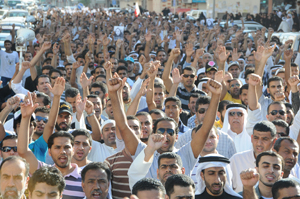BAHRAIN: Slashing Levies to Help Businesses Cope With Unrest

Bahrain is considering slashing or putting on hold levies on businesses to help them cope with the deteriorating economy, with losses topping an estimated at 500 million dollars since the beginning of unrest here in February.
The lifeline would mainly target small and medium sized enterprises (SMEs) that are at risk of bankruptcy with poor or no revenues coming in as a result of demonstrations and crackdowns on protests by the Bahrain Defence Force.
The unrest began Feb. 14 with protests and sit-ins demanding the overthrow of the ruling regime. All efforts to engage opposition in a national dialogue have failed so far, and the country has launched a crackdown to stop activists from blocking roads.
The Central Bank of Bahrain (CBB) has instructed banks to reschedule loans of companies - especially SMEs - to reduce financial pressure. Governor of the CBB, Rasheed Mohammed Al Maraj, also reiterated the readiness of the bank to cooperate with all financial institutions in order to ensure the continuity of banking operations for all economic sectors and individuals which will contribute to Bahrain’s economic growth.
The travel and tourism sector has been badly affected as it was counting on thousands of tourists visiting Bahrain during the formula one races that were called off along with many international conferences planed to take place in the first half of 2011.
According to the Customs Affairs office 11,185 vehicles and 23,637 travellers entered the country in the first day of the last year formula one races, and 12,334 vehicles and 35,548 travellers came in the second day, while on the third day 11,999 vehicles and 24,311 travellers, and on the fourth and final day 9,424 vehicles and 19,229 travellers arrived.
'We got 100 percent affected by the cancellation of the formula one, in which all our air-tickets, hotel and car rental bookings were cancelled, while incomes coming from [Gulf Cooperation Council] tourists dropt by more than 50 percent,' Abdullah Al Kubaisi, manager of Al Kubaisi Travel, told IPS.
'In such periods we - travel agencies - generate high incomes as a result of boom in the sector and the drop wasn’t expected,' he says, highlighting fear of permanent damage to the sector if some regional business offices that are based in Bahrain decide to shift to nearby cities.
Al Kubaisi highlighted that incomes from Saudi tourism have drastically declined. Official statistics reveal that 17 million travellers - 8,046 per day - crossed the King Fahad Causeway linking Bahrain to Saudi Arabia last year.
Self-employed citizens have been badly affected by the continuing unrest in Bahrain - taxi drivers are among are among this group. Saeed Khadem who has been in the taxi business for the last fifteen years is feeling the crunch and is finding it difficult to meet his family’s daily needs. 'It isn’t only me but all my colleagues - as the luckiest one of us will earn 50 dollars a day, which it is a small amount and most of it will be gone for fuel,' he said.
Saeed works in Juffair and deals mainly with foreigners, tourists and transit passengers.
The hospitality sector is also affected with a drop from 90 percent to 25 percent of room booked. Executive manager of Gulf Hotels Group, Aqeel Eaees, said: 'Our operations have been generally slow, in which hotels closed some of their rooms and suites and reduced the working hours of restaurants.'
International companies have not escaped. Microsoft reports that revenues will be down by then end of the current financial year - ending in June. Regional client official, Badea Esbaee, told the local press that his company couldn’t upgrade systems for companies in Bahrain. 'No company has cancelled deals with us, but many have delayed the upgrading of their scheduled IT systems,' he said.
There are no official figures about financial losses due to unrest in Bahrain, but analysts estimate the amounts to be about 500 million dollars. 'All sectors in Bahrain have suffered because of the current situations in the country, even the food sector, mainly because regular visitors from Gulf countries have stopped coming,' businessman Abdulrahman Fakhro said. He also predicted the closing of many companies and firing of local and foreign workers if the situation did not improve.
To save Bahrain’s economy from disaster, Saudi Prince Talal bin Abdulaziz Al Saud announced during a recent visit here, plans to continue investing in Bahrain. He said that his projects would aim to examine further opportunities for additional investment while at the same time supporting the development of banks and companies in Bahrain.
Bahrain was safe from much of the impact of the global financial global crisis due to its reserve foreign investment policy. But now the political conflicts are shaking the financial position of the country, as it is the regional hub for many sectors because of its open market policies and flexible legislation.
Minister of Foreign Affairs Shaikh Khalid Al Khalifa during his recent official visit to Turkey announced that currently maintaining security and stability in Bahrain are the regime’s top priority.
© Inter Press Service (2011) — All Rights ReservedOriginal source: Inter Press Service
 Global Issues
Global Issues